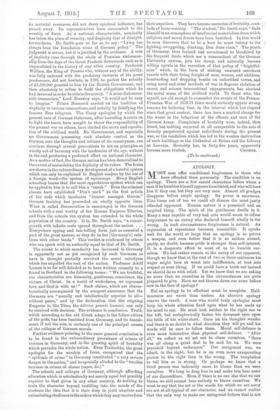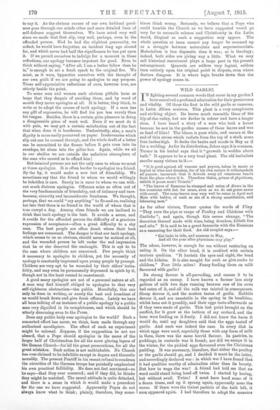APOLOGY.
MOST men offer conditional forgiveness to those who have offended them personally. The condition is an apology. There are a few rancid characters before whom a man if he bumbles himself appears humiliated, and who will hurt him if they can, but they are very rare. Almost. all grudges disappear before ample apology. Its power is enormous. Nine times out of ten we could all disarm the most justly offended opponent. Human nature is a possessed and an inspired thing. The spirit of the gentleman dwells in it. Many a man capable of very bad acts would scorn to refuse forgiveness to an enemy who declared himself wholly in the wrong. In such circumstances forgiveness is natural. An expression of repentance becomes irresistible. It speaks well for the world at large that an apology is so potent a weapon, and even better that it is so seldom abused, partly, no doubt, because pride is stronger than self-interest. It is a desperate effort to most of us to humble our- selves. We had rather remain at the mercy of our opponent, though we know that at the cost of two or three sentences his anger might turn at worst into indifference, at best into respect or even liking. If we could have a tooth out instead we should do so with relief. Yet we know that we are asking no more than we ourselves in like circumstances are quite prepared to give. Have we not thrown down our arms before now in the face of apology P But an apology to be effectual must be complete. Half- measures are worse than useless. An abortive apology renews the insult. A man who would truly apologize must keep his whole attention fixed upon what he has made up his mind to say. He must look neither to the right nor to the left, but metaphorically fasten his downcast eyes upon the folds of his white sheet. Once let his thoughts wander and there is no doubt in what direction they will go, and his words will be sure to follow them. Moral self-defence is even more instinctive than physical self-defence. "After all," we reflect as we set out to abase ourselves, " there was all along a great deal to be said for us. We were provoked beyond endurance." Our antagonist was, we admit, in the right, but he is an. even more exasperating person in the right than in the wrong. The temptation to tell him so is strong. Or perhaps we know that a third person was indirectly more to blame than we were ourselves. We long to drag him in and make him bear some of our discomfiture. Even if there is no one else that we can blame, we still cannot bear entirely to blame ourselves. We want to say that 04 act or the words for which we are sorry are not at all typical of our character, and we cannot realize that the only way to make our antagonist believe that is not to say it. As the obvious excuse of our own habitual good- ness goes through our minds other and more detailed lines of self-defence suggest themselves. We have acted very well since we made that first slip, very well, perhaps, even to the offended person. Had he had the slightest generosity, we reflect, he would have forgotten an incident long ago atoned for, and which never had half the significance be has put upon it. If we permit ourselves to indulge for a moment in these reflections, our apology becomes impotent for good. Even to think without saying, "After all, I am a better fellow than he is," is enough to set a fresh spark to the original fire. We must, as it were, hypnotize ourselves with the thought of our own guilt if we are going to apologize to any purpose. These self-appreciative reflections of ours, however true, are utterly beside the point.
To some men and women such obvious pitfalls loom so large that they despair of avoiding them, and by -word of mouth they never apologize at all. It is better, they think, to write or to adopt the course of tacit apology. If a man has any gift of expression, he will find his pen less unruly than his tongue. Besides, there is a certain grim pleasure in doing a disagreeable piece of work well. Even if we must do it with pain, we may get a certain satisfaction out of the fact that when done it is handsome. Undoubtedly, also, a man's dignity is more easily preserved on paper. Irrelevancies which slip out can be crossed through, and the whole draft of a letter can be committed to the flames before it gets even into its envelope, let alone into the pillar-box. Again, while we it in our studies we are outside the nefarious atmosphere of the man who caused us to offend him !
But inimical persons are not the only ones to whom we must it times apologize. It is often harder to apologize to a friend.
By the by, it would make a new test of friendship. We sometimes say that the friend to whom we would willingly be beholden is rare. Surely he is rarer to whom we can with- out much distress apologize. Offences arise so often out of the very fundamentals of friendship, out of intimacy and care- lessness, sincerity and inconsiderate frankness. We thought, perhaps, that we could "say anything" to So-and-so, realizing too late that there is no friend in the world of whom that is true except a dog. Among close friends we are inclined to think that tacit apology is the best. It avoids a scene, and it avoids for the offended person the difficulty of a gracious expression of acceptance—often a great difficulty to a shy man. The best people are often dumb where their best feelings are concerned. The danger is that our tacit apology, which seems to us so obvious, should never be noticed at all, and the wounded person be left under the sad impression that he or she deserved the onslaught. This is apt to be the case where children are concerned. Few people think it necessary to apologize to children, yet the necessity of apology is constantly impressed upon young people by precept. Children are very apt to be wounded by their elders' irrita- bility, and may even be permanently depressed in spirit by it, though not in the least roused to resentment.
A good many apologies are not of a personal nature at all. A man may find himself obliged to apologize to that very
self-righteous abstraction—the public. Mercifully, this can
only be done in writing, or surely the best and humblest of us would break down and give fresh offence. Lately we have all been talking of an instance of a public apology by a public man very dignified in its completeness, and which should be utterly disarming even to the Press.
Does any public body ever apologize to the world? Such a concerted effort has never, we think, been made through any authorized mouthpiece. The effect of such an experiment might be colossal. Suppose, if the supposition be not too absurd, that a Pope should apologize in the name of the larger half of Christendom for all the more glaring lapses of the Roman Church—for all the great persecutions, for all the great mistakes. Such action is not unthinkable, No Church has ever claimed to be infallible except in dogma and theoretic morality. The present Pontiff in his recent refusal to condemn the atrocities of the German troops has pointedly emphasized his own practical fallibility. He does not feel convinced—so be says—that they ever occurred; and if they did, he thinks they might be matched. The moral attitude is quite detached, and there is a sense in which it would make a precedent for the one we have suggested. Apparently Popes do not always know what to think; plainly, therefore, they some• times think wrong. Seriously, we believe that a Pope who could humble the Church as we have suggested would go very far to reconcile science and Christianity in the Latin world, illogical as such a suggestion may appear. Tho whole question at issue cannot any longer be summed up as a struggle between naturalists and supernaturalists. Materialism is less dogmatic than it was; so is theology ; indeed, both sides are giving way a little. What we may call historical resentment plays a large part in the present estrangement. Quarrels are seldom very logical, seldom turn entirely upon the original point in dispute, even where doctors disagree. It is where logic breaks down that the power of apology comes in.



































 Previous page
Previous page